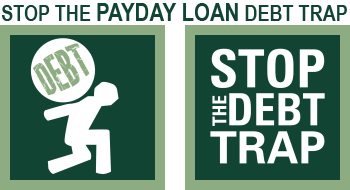 Recently, the organization Allied Progress released a new report, Cheaper By the Dozen, highlighting the relationship between members of Congress and the payday lending industry. The report covers a dozen members of the House of Representatives who, since 2011, have received at least $25,000 in campaign contributions from the payday lending industry and have taken action in support of the industry within 10 weeks of receiving the money.
Recently, the organization Allied Progress released a new report, Cheaper By the Dozen, highlighting the relationship between members of Congress and the payday lending industry. The report covers a dozen members of the House of Representatives who, since 2011, have received at least $25,000 in campaign contributions from the payday lending industry and have taken action in support of the industry within 10 weeks of receiving the money.
Payday loans are billed as an easy way to deal with one-time financial emergencies. What the lenders don’t tell their customers is that the combination of exorbitant interest (often as high as 300-500%) and direct access to the borrower’s checking account often compels people to take out new loans to cover the fees and interest on the old ones, trapping them in a long-term cycle of debt.
The industry holds tremendous power in Washington, even though payday lenders are tremendously unpopular with the public (a bipartisan poll conducted on behalf of the Center for Responsible Lending found that only 11% of Americans polled had a positive view of payday lenders). No surprise, since during the 2014 election cycle alone the payday industry poured over $15 million into political campaigns. This influence means that Congress may block the CFPB from acting against payday lenders on behalf of the consumers.
Cheaper by the Dozen identifies 12 lawmakers who have taken action to benefit payday lenders within days of receiving campaign contributions from industry executives and Political Action Committees (PACs). Some leading examples:
- On March 16, 2011 Patrick McHenry (R-NC 10th) added his name to the list of House cosponsors of H.R. 1121, a bill designed to hobble the Consumer Financial Protection Bureau, which had authorized to study and regulate payday loans. Just five days later, his campaign received $17,900 from payday executives, and nine days after that a further $15,000 from industry PACs.
- On March 26, 2015 Pete Sessions (R-TX 32nd) became a cosponsor of H.R. 1266 (a newer version of H.R. 1121). The next day, Rep. Sessions received $2,700 from a payday lending PAC
- On July 18th 2012, Rep. Blaine Luetkemeyer (R-MO 3rd) introduced H.R. 6139, which would allow payday lenders to bypass CFPB oversight and stronger state laws by moving federal jurisdiction over non-bank financial services from the CFPB to the Office of the Comptroller of the Currency. The day before introducing the legislation, Luetkemeyer refunded a $2,500 contribution from Community Financial Services Association of America (CFSA) – a major payday industry trade group. Two months later, however, Rep. Luetkemeyer received another CFSA donation for $5,000, twice the original amount
- Days before declaring his support for Rep. Luetkmeyer’s H.R. 6139, Stephen Fincher (R-TN 8th) received $5,000 in campaign contributions from payday lending executives. After he became a cosponsor of the bill, another executive donated an additional $2,500.
- Within four days of agreeing to co-sponsor H.R. 1566 (legislation with the same title and purpose as H.R. 6139), Gregory Meeks (D-NY 5th) received a $5,000 contribution from a payday lending industry PAC
The other lawmakers include Representatives Alcee Hastings (FL-20th, received $38,000), Steve Stivers (OH-15th, received $69,625), Jeb Hensarling (TX-5th, received $85,750), and Kevin Yoder (KS-3rd, received $100,357).
